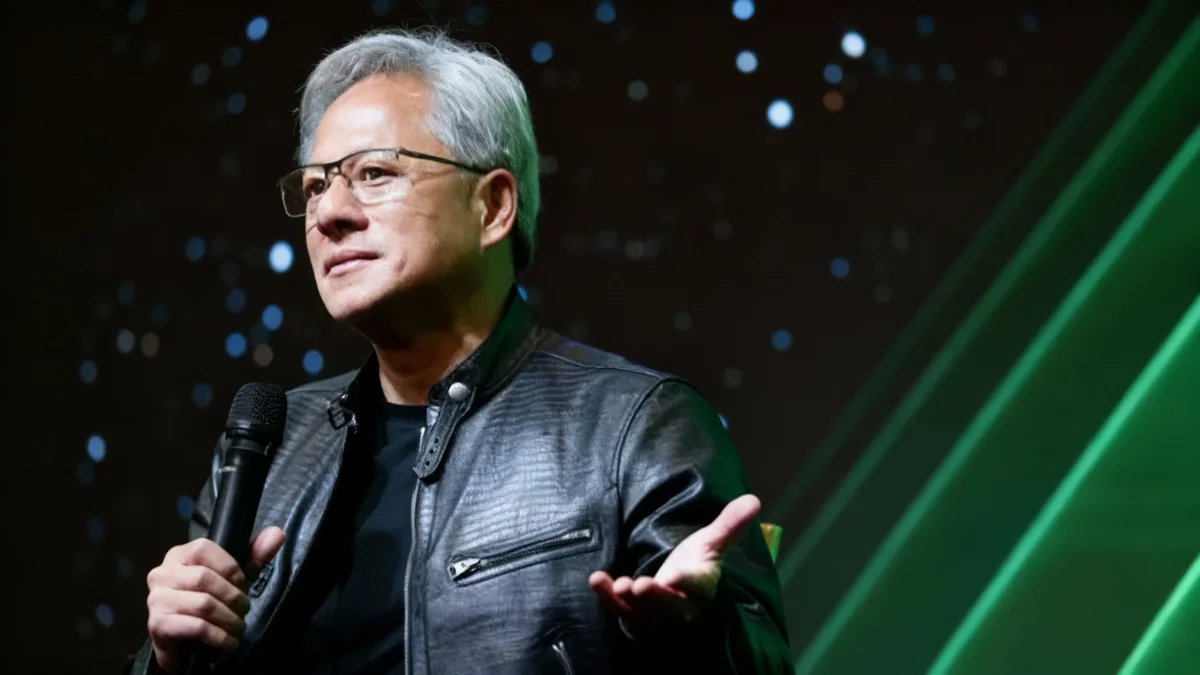Nvidia has secured a significant deal to supply over 260,000 of its most advanced artificial intelligence chips to the South Korean government and several of the nation's largest technology companies. The agreement, which includes industry giants like Samsung, LG, and Hyundai, aims to bolster South Korea's ambition to become a regional AI powerhouse.
The announcement was made by Nvidia CEO Jensen Huang during the Asia Pacific Economic Cooperation (APEC) summit in Gyeongju. This development comes as Nvidia's market valuation surpassed an unprecedented $5 trillion, highlighting the immense global demand for its AI hardware.
Key Takeaways
- Nvidia will supply more than 260,000 advanced AI chips to South Korean government and corporate entities.
- Key recipients include Samsung, LG, Hyundai, Kakao, and Naver for use in factories, robotics, and autonomous vehicles.
- The deal supports South Korea's strategic goal of building "sovereign AI" infrastructure.
- The announcement coincided with Nvidia becoming the first company to reach a $5 trillion market valuation.
- Nvidia CEO Jensen Huang expressed disappointment over losing market share in China due to U.S. export controls.
South Korea's Sovereign AI Ambition
The agreement is a cornerstone of South Korea's strategy to develop independent AI capabilities, a concept known as "sovereign AI." The government plans to use its share of the chips to build out the National AI Computing Center, creating a powerful domestic computing infrastructure.
Corporate partners will integrate the Nvidia chips directly into their manufacturing and development processes. Companies like Samsung, LG, and Hyundai will leverage the technology to advance everything from semiconductor production and robotics to the development of autonomous vehicles. Internet giants Kakao and Naver will also use the hardware to power their data centers.
During the APEC summit, Nvidia CEO Jensen Huang stated that the deal means South Korea can "now produce intelligence as a new export." He emphasized that the country's existing infrastructure, including access to energy and land, makes it an ideal location for expanding AI infrastructure.
Digital Twins and a Connected Future
A key application of this new computing power will be the creation of "digital twins." This technology allows companies to build virtual replicas of their factories and systems. By running simulations on these digital models, they can optimize production, test new processes, and improve efficiency without disrupting physical operations.
Huang noted that with these chips, South Korean companies would be able to create digital twins that connect with other factories around the world, fostering a more integrated and intelligent global manufacturing network.
What is Sovereign AI?
Sovereign AI refers to a nation's capacity to develop and control its own artificial intelligence infrastructure, data, and workforce. The goal is to reduce dependency on foreign technology and ensure that AI development aligns with national interests, security, and economic goals. The South Korean government's investment in Nvidia chips is a direct move to establish this capability.
Navigating US-China Trade Tensions
While Nvidia celebrates its expansion in South Korea and its historic market valuation, the company continues to navigate the complex landscape of the US-China trade war. U.S. export controls prevent Nvidia from selling its most advanced AI chips to China, a market that previously accounted for a significant portion of its revenue.
Speaking in Gyeongju, Huang expressed his frustration with the situation.
"We used to have 95% share of the AI business in China. Now we're at 0% share. And I'm disappointed by that," Huang said.
The restrictions have been a point of friction with Washington, which has cited national security concerns over Beijing potentially using the technology for military applications. These concerns have led the U.S. to impose strict export controls on high-end semiconductors.
A Shifting Market
China constituted over 10% of Nvidia's revenue last year before the full impact of the expanded U.S. export controls. The loss of this market has forced Nvidia to pivot its strategy while creating an opportunity for domestic Chinese chipmakers to grow.
Hopes for a Thaw
Recent high-level talks between U.S. and Chinese leaders have provided a glimmer of hope. Following a meeting between President Trump and President Xi, it was announced that Beijing would hold discussions with Nvidia regarding chip sales. President Trump characterized the U.S. government's role in these potential talks as that of a "referee."
Huang stated he would like to sell Nvidia's state-of-the-art Blackwell chips to China but acknowledged the decision rests with the U.S. President. He emphasized the mutual benefits of trade.
"It's in the best interest of America to have the China market and it's in China's interest to have an American company bring technology to the country," Huang commented, adding, "We'd like to see American technology be the global standard."
The Rise of Domestic Competition
The U.S. restrictions, while intended to curb China's technological advancement, have inadvertently spurred innovation within the country. Chinese tech giants like Huawei and Alibaba have developed their own AI chips, which they claim can compete with Nvidia's offerings for the domestic market.
Furthermore, reports indicate that Beijing has encouraged local companies to purchase from Chinese chipmakers, aiming to build a self-reliant domestic tech industry. This presents a long-term competitive challenge for Nvidia, even if current trade restrictions are eased.
Recognizing this, Huang acknowledged the capabilities of Chinese firms. "We respect deeply the capabilities of China," he said on Friday.
Nvidia's Broader Global Push
The South Korea deal is part of a wider global strategy for Nvidia. The company has been aggressively forming partnerships across various sectors to integrate its AI technology into more products and services. This week alone, Nvidia announced collaborations with:
- The U.S. Department of Energy
- Nokia
- Uber
- Stellantis
These moves, coupled with the potential for renewed sales to China, have reassured investors and propelled Nvidia's stock to new heights, solidifying its position as a central player in the global AI revolution. The company's success relies heavily on its Asian supply chain partners, including TSMC for advanced chip manufacturing and Samsung for components in its scaled-down processors designed for the Chinese market under previous U.S. rules.





